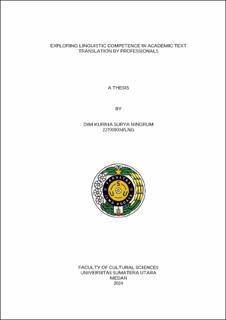Exploring Linguistic Competence in Academic Text Translation By Professionals

Date
2024Author
Ningrum, Dwi Kurnia Surya
Advisor(s)
Sofyan, Rudy
Saragih, Erikson
Metadata
Show full item recordAbstract
This study aimed to explore linguistic competence in academic text translation by professional translators, focussing on their awareness of linguistic competence, dominant linguistic competence, challenges and strategies, and the impact of Machine Translation (MT) and AI-driven software on their workflow. The research considered sub-competence form PACTE TC‟s model in 2003, which includes pragmatic, sociolinguistic, textual, grammatical, and lexical aspects. A qualitative research design by Creswell & Creswell with a descriptive method was employed to delve deeply into the subjective experiences and perspectives of professional translators. A structured questionnaire was administered to professional translators who met criteria based on PACTE‟s criteria, having a minimum of five years of experience in translating academic materials. The surveys conducted via Google Form from March to April 2024. The result indicate that the respondents demonstrated a high level of awareness regarding linguistic competence, with a strong understanding of pragmatic, sociolinguistic, textual, grammatical, and lexical aspects. Respondents also identified various linguistic challenges, including lexical, textual, and sociolinguistic issues. Strategies to overcome these challenges included using online resources, performing human checks, and continuous learning. Besides that, the results also indicate several of attitudes towards MT and AI, with some translators embracing these tools for efficiency and others maintaining a preference for manual methods. While respondents acknowledged the benefits of MT and AI were perceived to positively impact to overall quality of translations, particularly in terms of grammar accuracy and efficiency. However, limitations in response depth and variability among participants highlight the need for future research include exploring the effectiveness of different MT and AI tools, examining the balance between technological assistance and human expertise in producing high-quality translations and investigating the impact of training programs.
